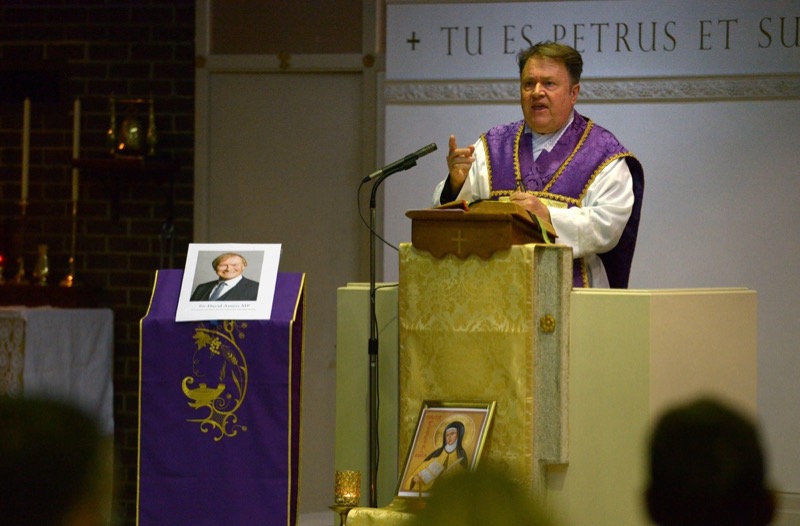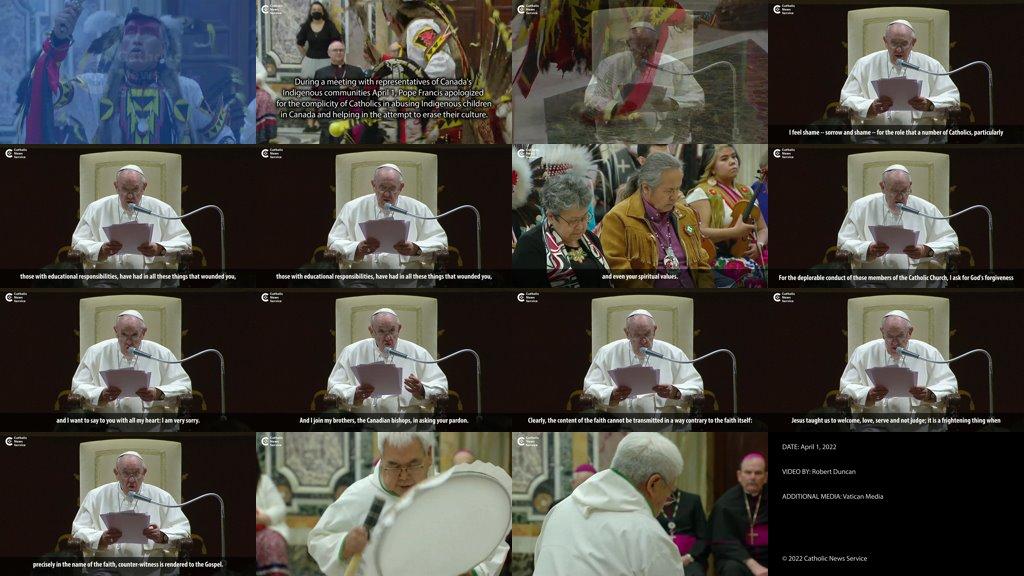Listening to, and making space for, Indigenous communities is a central part of the Catholic Church’s ministry in a number of countries. This is the key to understanding Pope Francis’ historic apology for the Church’s role in running state-funded Canadian boarding schools that abused indigenous children for 100 years. The Pope’s words and apology to Canada’s First Nations communities also show the importance of the 2019 synod on the Amazon, where indigenous from that region faced attacks from certain Catholic groups.
The treatment of the indigenous in Canada is deeply shocking. Between the 1800s and the 1990s more than 150,000 children were taken from their families and sent to residential schools in Canada with 1,300 unmarked graves recently discovered at Church-run schools.
Over the course of a week, the Pope carved out significant amounts of time in his diary to meet and listen to survivors of the schools and Indigenous representatives. They had travelled to Rome seeking a long-awaited papal apology.
“For the deplorable conduct of those members of the Catholic Church, I ask for God's forgiveness and I want to say to you with all my heart: I am very sorry...I join my brothers, the Canadian bishops, in asking your forgiveness,” Francis said during a meeting with indigenous delegates in the Apostolic Palace on 1 April.
“I feel shame – sorrow and shame – for the role that a number of Catholics, particularly those with educational responsibilities, have had in all these things that wounded you, in the abuses you suffered and in the lack of respect shown for your identity, your culture and even your spiritual values. All these things are contrary to the Gospel of Jesus Christ,” he added.
The 85-year-old Roman Pontiff also told them he will travel to Canada to show “my closeness”, and to continue the process of healing. One of the recommendations of Canada’s Truth and Reconciliation Commission on the legacy of residential schools is that the Pope make an apology on Canadian soil.
In his speech, Francis explained that a failure to “welcome, love, serve and not judge” is a “counter-witness” to the Gospel. For the Church, the original sin was an inability to see the presence of God among indigenous cultures.
This was a central part of the Amazon synod in 2019, an attempt by Francis to give a voice to the indigenous of that region, and to support a church with an "Amazonian face". Indian Cardinal Oswald Gracias, speaking at a press conference during that synod, explained that inculturation, the notion that the Church responds and adapts to local customs and traditions, “flows from the Incarnation”.
But the synod faced fierce opposition from elements inside the Church. As the assembly got underway the Pope said he had heard a “sarcastic comment about a pious man with feathers on his head” who had taken up the offertory during the opening Mass in St Peter’s Basilica. “Tell me,” Francis asked, “What’s the difference between having feathers on your head and the three-peaked hat worn by certain officials in our dicasteries?”
During the synod hardline groups repeatedly attacked the use of indigenous statues in events leading up to and around the synod, and one activist even seized some of the statues and threw them in the River Tiber. The papal apology to Canada’s indigenous and listening to their stories of being abused puts that shameful episode into an even worse light.
Furthermore, the moral panic over the “Pachamama” statues during the synod demonstrated an astonishing theological and historical ignorance of how Christianity had incorporated pagan elements into its practices. These elements, as St John Henry Newman explained, included everything from vestments to ecclesiastical chant.
Francis’ spiritual accompaniment of the indigenous also follows in the footsteps of Pope John Paul II. In 2001, the Polish Pope apologised via e-mail for the “shameful injustices” perpetrated by the Church against Australia’s aboriginal people, “especially where children were forcibly separated from their families”. Aboriginal authorities say that 30,000 Aboriginal children in Australia were forcibly separated from their parents in a church-backed government attempt to educate them and assimilate them into white culture.
During a 1986 visit to Australia, John Paul II gave a powerful speech in Alice Springs recognising the unique culture of indigenous, where he emphasised that “the Gospel of our Lord Jesus Christ speaks all languages. It esteems and embraces all cultures.” He also pointed out that the 19th century Archbishop of Sydney, Bede Polding, an English Benedictine monk, had “strongly pleaded for the rights of the Aboriginal inhabitants to keep the traditional lands on which their whole society depended.”
Francis wants the Church to face up to and not repeat the tragedies of history. While the Amazon synod shows an anti-indigenous mentality is still hard to shake, a listening Church is able to bring healing.
After meeting the Pope this week, Angie Crerar, an 85-year-old survivor, spoke of her experience. It had, she said, “helped erase” 20 years of hurt.



 Loading ...
Loading ...